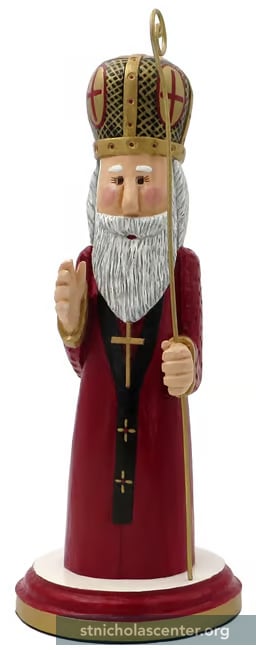Lessons of life and leadership from the real St. Nicholas
by Tom Urbaniak

Margaret Maringgele, Tree Treasures, Courtenay, British Columbia, Canada
St Nicholas Center collection
In times of turmoil and adversity, he showed that no person is expendable
Saint Nicholas, the historical and humble bishop of Myra (in present-day Turkey), put individual people before systems, before ideologies and before arguments about doctrine and politics.
This Christmas, I am reflecting on what we can learn—what I can learn—from the way in which the actual Saint Nicholas went about his difficult work and hard life.
Can his example somehow help me to be a better community person?
Nicholas was born around the year 270. None of his writings has survived. But his ministry produced extensive oral testimonies in disparate locations. People—not just Christians—loved this gentle soul. Many of these passed-down memories were later recorded or interpreted in writing.
Some of the tomes, such as "The Life of Saint Nicholas," written by Michael the Archimandrite in the ninth century, were "hagiographies." In other words, they were specifically intended to idealize the person and, thus, inspire readers.
But in recent years there has been solid academic scholarship on the life of Nicholas. I particularly enjoyed Prof. Adam English’s book The Saint Who Would be Santa Claus: The True Life and Trials of Nicholas of Myra (Baylor University Press, 2012).
When Nicholas was born, there were only about two million Christians in the world. They usually met in private homes, and the act of gathering together was important to them. Their bishops were mostly not ladder-climbing mini-princes wearing expensive rings, but courageous guides, travellers (slogging through physical pain, which Nicholas himself experienced) and spiritual healers. They were usually selected by the priests or laity of their region.
Nicholas was not a convert. Both of his parents, who likely died during an epidemic when Nicholas was a teenager, are thought to have already been Christians.
People—not just Christians—loved this gentle soul.
The Christian community was known for doing good deeds for strangers and for identifying with the poor and weak. Although the Christians had their disputes about how to understand the Gospels, and disagreed on who was really in communion with them, they were not yet weighed down with volumes of canon law, palatial real estate, many layers of hierarchy and cold church bureaucracies.
The core teachings of Jesus were still fresh for them: Love one another. Love your enemies. God loves everyone. Side with the weak. Don’t get corrupted by ambition and power. Be true to the holy light within you. Be joyful in the face of adversity. Form communities to serve.
This was still before the Emperor Constantine embraced Christianity. That happened in the year AD 312—during the life of Nicholas—and dramatically changed power dynamics in many places, sometimes corrupting the Christian leaders.
It seems that Nicholas had spent time in jail for his beliefs and teachings. But as power shifted in the Christians’ favour, his head did not swell. His leadership was still personal. His approach was still about taking risks to extend love and perform good deeds.
For Nicholas, no person was expendable or disposable.
In places where Nicholas ministered, infanticid—killing newborn babies or toddlers—was not precluded by law. Nor was selling daughters into sexual slavery. Women were sometimes killed with total impunity. Nicholas was reported to have raised money to purchase the rescue of victims, intending to pay anonymously.
From the sources, it is also quite likely he intervened for mistreated prisoners and denounced bribed judges who were willing to unjustly condemn people. He pleaded with generals to stop looting. He befriended foreign sailors, fed them and prayed with them before perilous journeys.
Most of the time, there would be no reward for him. He knew he would never see the people again.
Sources are divided on whether Nicholas was at the famous First Council of Nicaea (year AD 325). The Council was held to resolve doctrinal disputes on such questions as the relationship of Jesus to the Father. Although there are a few accounts of Nicholas getting into some kind of fight at the Council, it’s more likely that he was a minor player among the 200 or more bishops who were there.
Indeed, I would not be surprised if Nicholas glazed over the finer points. His worldview seemed to be more about justice through solidarity with others than it was about insisting on dogma.
In our time and place, I hope for the "Nicholas way": love and kindness without expectation of return; love and kindness even after we have been hurt in some way.
And may I have the courage to not look the other way when someone is forgotten or mistreated.
Dr. Tom Urbaniak is a professor of political science at Cape Breton University, Sydney, Nova Scotia, Canada.
By Tom Urbaniak, from The ChronicleHerald, December 18, 2019. Permission pending.

